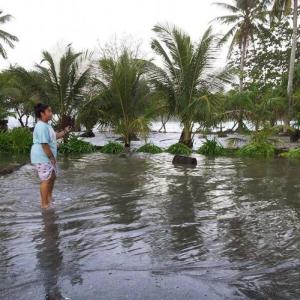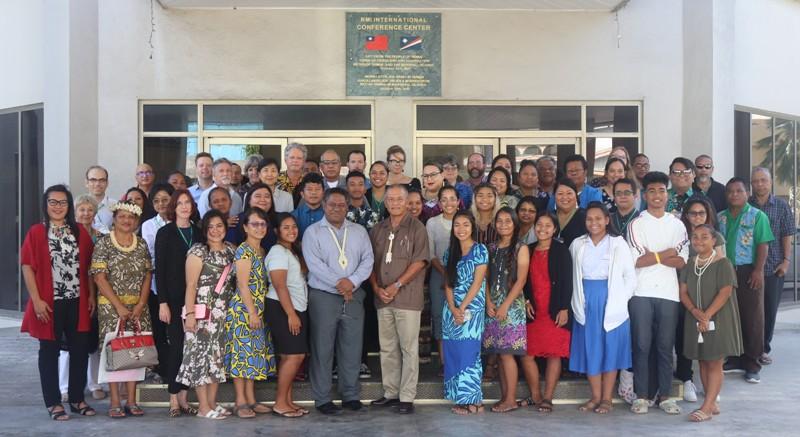Error message

The Pacific RISA (Regional Integrated Science and Assessment) program team is working with the Marshall Islands Ministry of Health and Human Services, the US National Oceanic and Atmospheric Administration (NOAA), and the University of Hawai’i Sea Level Center on the Marshall Islands Climate and Migration Project. The aim of the project is to improve climate information delivery to the health sector in the Republic of the Marshall Islands (RMI) and to inform health service providers in Hawai’i about migration, health, and climate change in the Pacific Islands region.
As citizens of one of the lowest-lying nations in the world, residents of the Marshall Islands are experiencing changes that may affect the very habitability of their land. Storms and sea-level rise threaten island infrastructure such as homes, hospitals, roads, and essential health services. Drought and rising temperatures reduce freshwater supplies, while heavy rainfall increases the risk of floods and vector-borne diseases. Food supplies are reduced by ocean acidification, and increasing reliance on imported goods can exacerbate existing problems with diabetes and obesity.
The health sector is particularly influenced by sub-seasonal and seasonal changes in temperature, rainfall, and extreme events, as well as longer-term impacts such as sea-level rise and ocean acidification. With a population spread across two million square kilometers, the Marshall Islands’ healthcare system may be unprepared to cope with these changes. Recent work by Pacific RISA found that 25–45 percent of households experienced health-related impacts due to climate stress over the past five years. As communities adapt, migration has also increased. More than three-quarters of Marshall Islanders now live in the urban centers of Majuro and Kwajalein. More than 25,000 Marshallese currently live in the US—an increase of 400 percent since 2000. About 10,000 Marshallese live in the state of Hawai’i, where many lack access to healthcare, are affected by unique diseases, require translation services, and may face discrimination within the system. As this population increases, so does the health sector’s need for information about them.
Specifically, decision-makers at local and state levels in both the Marshall Islands and the United States need information to better understand the factors contributing to current migration and to anticipate possible future impacts of climate on migration. To address these needs, the Pacific RISA team has helped conduct meetings about climate change and health in Majuro and Honolulu.
2020 Climate, Health, and Migration Workshop
On 30–31 January 2020, the First National Climate Change and Health Dialogue was held in Majuro, RMI. Organized by Pacific RISA staff and the RMI Ministry of Health and Human Services, the two-day meeting was held in collaboration with the RMI Office of Environment, Planning, Policy, and Coordination (which has since been renamed the Climate Change Directorate), the World Health Organization, and the US National Oceanic and Atmospheric Administration (NOAA). The dialogue was attended by RMI President-Elect David Kabua, outgoing President Hilda Heine, the Minister of Health and Human Services Bruce Bilimon, the Secretary of the Ministry of Health and Human Services Jack Neidenthal, the Chief Secretary of the Office of Environmental Planning and Policy Coordination Clarence Samuel, and representatives of other organizations, including the Ministry Of Natural Resources and Commerce, the Marshall Islands Red Cross Society, the Marshall Islands Marine Resources Authority, the RMI Ministry of Finance, the College of the Marshall Islands, the Marshall Islands Council of Non-Governmental Organizations, the International Organization for Migration, the RMI National Disaster Management Office, the Ministry of Culture and Internal Affairs, several high school classes, and other interested individuals.
This two-day meeting was based on the Climate Services Dialogues model. Created by the Pacific Regional Climate Services Director for NOAA (and East-West Center Adjunct Senior Fellow) Dr. John Marra, Climate Services Dialogues are a participant-driven group process designed to be appropriate for Pacific cultures. Dialogues solicit the relevant experiences and knowledge of meeting participants to create accessible, understandable “climate stories” meant to share key messages and best practices. Participants at the 1st National Climate Change and Health Dialogue shared their experiences related to climate and health, created common timelines of events, and discussed past successes and failures in small groups. The work conducted at these meetings, guided by Pacific RISA staff, will be used to create the climate and health stories that are a key component of this project.

2020 Humanism, Empathy, Social Justice, and Global Health Symposium
On 14 February 2020, the East West Center co-sponsored the 2020 Humanism, Empathy, Social Justice, and Global Health Symposium, along with the University of Hawai‘i's System Global Health and Social Justice Work Group, the University of Hawaii's John A. Burns School of Medicine, Noguchi Medical Research, Inc., the Office of Public Health Studies, and Dr. Yoshihisa Asano. Held at the University of Hawaii’s John A. Burns School of Medicine, this year’s symposium focused on Pacific Islander health. Beginning with a networking event for professionals interested in global health and the Pacific Islands on the evening of 13 February, the symposium went on to include a full day of oral and poster presentations of research and projects from the region, culminating with a keynote address by Dr. Sheldon Riklon. The Medical Director for the Center on Pacific Island Health at the University of Arkansas for Medical Sciences Northwest and a University of Hawai’i alumni, Dr. Riklon is one of only two US-certified medical doctors from the Marshall Islands. In addition, the East-West Center’s Vice President and Director of Research, Ambassador Karena Lyons served as judge for the Best Poster Award, selecting Dr. Jennifer Chin’s “Urine Drug Screening on Labor and Delivery” as the winner from 12 participating posters.

The Pacific RISA (Regional Integrated Science and Assessment) program team is working with the Marshall Islands Ministry of Health and Human Services, the US National Oceanic and Atmospheric Administration (NOAA), and the University of Hawai’i Sea Level Center on the Marshall Islands Climate and Migration Project. The aim of the project is to improve climate information delivery to the health sector in the Republic of the Marshall Islands (RMI) and to inform health service providers in Hawai’i about migration, health, and climate change in the Pacific Islands region.
As citizens of one of the lowest-lying nations in the world, residents of the Marshall Islands are experiencing changes that may affect the very habitability of their land. Storms and sea-level rise threaten island infrastructure such as homes, hospitals, roads, and essential health services. Drought and rising temperatures reduce freshwater supplies, while heavy rainfall increases the risk of floods and vector-borne diseases. Food supplies are reduced by ocean acidification, and increasing reliance on imported goods can exacerbate existing problems with diabetes and obesity.
The health sector is particularly influenced by sub-seasonal and seasonal changes in temperature, rainfall, and extreme events, as well as longer-term impacts such as sea-level rise and ocean acidification. With a population spread across two million square kilometers, the Marshall Islands’ healthcare system may be unprepared to cope with these changes. Recent work by Pacific RISA found that 25–45 percent of households experienced health-related impacts due to climate stress over the past five years. As communities adapt, migration has also increased. More than three-quarters of Marshall Islanders now live in the urban centers of Majuro and Kwajalein. More than 25,000 Marshallese currently live in the US—an increase of 400 percent since 2000. About 10,000 Marshallese live in the state of Hawai’i, where many lack access to healthcare, are affected by unique diseases, require translation services, and may face discrimination within the system. As this population increases, so does the health sector’s need for information about them.
Specifically, decision-makers at local and state levels in both the Marshall Islands and the United States need information to better understand the factors contributing to current migration and to anticipate possible future impacts of climate on migration. To address these needs, the Pacific RISA team has helped conduct meetings about climate change and health in Majuro and Honolulu.
2020 Climate, Health, and Migration Workshop
On 30–31 January 2020, the First National Climate Change and Health Dialogue was held in Majuro, RMI. Organized by Pacific RISA staff and the RMI Ministry of Health and Human Services, the two-day meeting was held in collaboration with the RMI Office of Environment, Planning, Policy, and Coordination (which has since been renamed the Climate Change Directorate), the World Health Organization, and the US National Oceanic and Atmospheric Administration (NOAA). The dialogue was attended by RMI President-Elect David Kabua, outgoing President Hilda Heine, the Minister of Health and Human Services Bruce Bilimon, the Secretary of the Ministry of Health and Human Services Jack Neidenthal, the Chief Secretary of the Office of Environmental Planning and Policy Coordination Clarence Samuel, and representatives of other organizations, including the Ministry Of Natural Resources and Commerce, the Marshall Islands Red Cross Society, the Marshall Islands Marine Resources Authority, the RMI Ministry of Finance, the College of the Marshall Islands, the Marshall Islands Council of Non-Governmental Organizations, the International Organization for Migration, the RMI National Disaster Management Office, the Ministry of Culture and Internal Affairs, several high school classes, and other interested individuals.
This two-day meeting was based on the Climate Services Dialogues model. Created by the Pacific Regional Climate Services Director for NOAA (and East-West Center Adjunct Senior Fellow) Dr. John Marra, Climate Services Dialogues are a participant-driven group process designed to be appropriate for Pacific cultures. Dialogues solicit the relevant experiences and knowledge of meeting participants to create accessible, understandable “climate stories” meant to share key messages and best practices. Participants at the 1st National Climate Change and Health Dialogue shared their experiences related to climate and health, created common timelines of events, and discussed past successes and failures in small groups. The work conducted at these meetings, guided by Pacific RISA staff, will be used to create the climate and health stories that are a key component of this project.

2020 Humanism, Empathy, Social Justice, and Global Health Symposium
On 14 February 2020, the East West Center co-sponsored the 2020 Humanism, Empathy, Social Justice, and Global Health Symposium, along with the University of Hawai‘i's System Global Health and Social Justice Work Group, the University of Hawaii's John A. Burns School of Medicine, Noguchi Medical Research, Inc., the Office of Public Health Studies, and Dr. Yoshihisa Asano. Held at the University of Hawaii’s John A. Burns School of Medicine, this year’s symposium focused on Pacific Islander health. Beginning with a networking event for professionals interested in global health and the Pacific Islands on the evening of 13 February, the symposium went on to include a full day of oral and poster presentations of research and projects from the region, culminating with a keynote address by Dr. Sheldon Riklon. The Medical Director for the Center on Pacific Island Health at the University of Arkansas for Medical Sciences Northwest and a University of Hawai’i alumni, Dr. Riklon is one of only two US-certified medical doctors from the Marshall Islands. In addition, the East-West Center’s Vice President and Director of Research, Ambassador Karena Lyons served as judge for the Best Poster Award, selecting Dr. Jennifer Chin’s “Urine Drug Screening on Labor and Delivery” as the winner from 12 participating posters.

